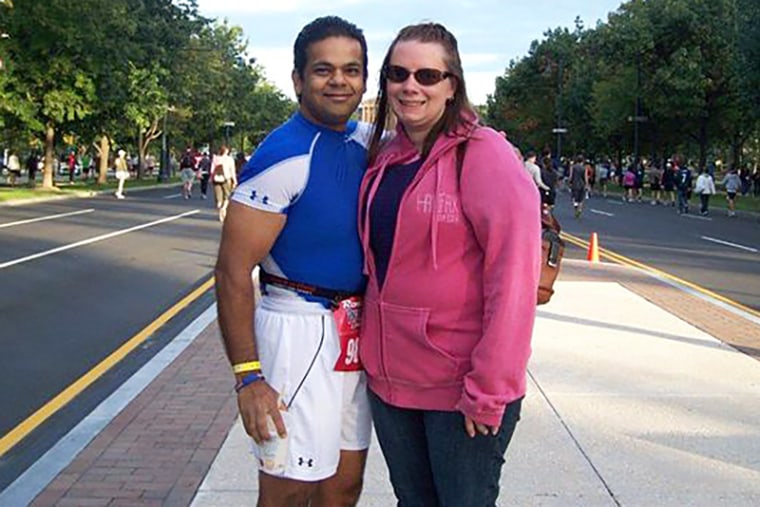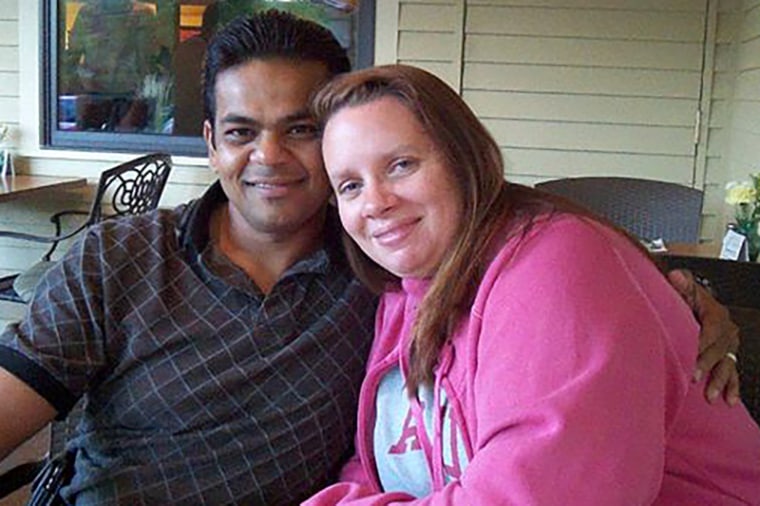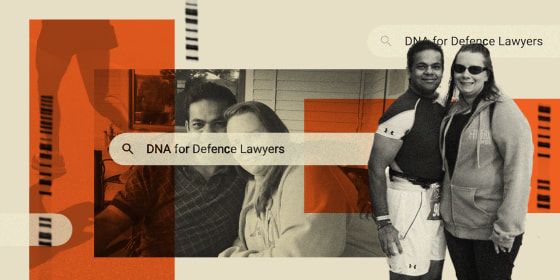The judge’s decision was stunning, but so were the allegations.
After the 2014 murder trial of a New York man accused of killing his wife, the judge wrote that the defendant’s lawyer was so unprepared and inexperienced that he relied on Google for help with forensics and pulled questions directly from an Australian web page, “DNA for Defence Lawyers.”
On Oct. 6, 2022, the judge overturned the conviction of Ganesh Ramsaran, 48, and ordered a new trial, citing the defense lawyer’s “egregious” conduct.
Four months ago, that case concluded with a plea agreement. In a courtroom southeast of Syracuse, Ramsaran — former IBM project manager and marathon runner known as “Remy” — pleaded guilty to manslaughter in the disappearance and death more than a decade ago of his wife, Jen Ramsaran, 36.
Remy, who had been serving a 25-to-life prison term, was sentenced to 22 years. Including time he’s already spent behind bars, he’s expected to remain in prison for less than a decade.
But in an exclusive interview with “Dateline,” Remy said he pleaded guilty in Jen’s death only because it was “the smartest thing to do legally.”
“I’m innocent,” he said. “I’ve always been innocent.”
Remy’s former lawyer, Gilberto Garcia, declined to comment on a detailed list of questions from “Dateline” about the allegations described in the judge’s decision but said he “respects” the order that granted a new trial.
‘The perfect life: A wife and a girlfriend’
Jen, who had three children with Remy, disappeared on Dec. 11, 2012. Remy told “Dateline” that before she vanished, she’d gone shopping in Syracuse, roughly 60 miles from their home in the small town of New Berlin. He’d done some work on a project, then went for a run, he said.
When Remy didn’t hear from her by that night, he called 911 and reported her missing, a transcript of the call shows.

In the days that followed, Remy found Jen’s cellphone in a creek bed using the “Find My iPhone” app, the Chenango County sheriff’s detective who investigated the case, Richard Cobb, told “Dateline” at the time. On Dec. 16, Jen’s father alerted authorities that he had spotted her van — a Chrysler Town & Country — abandoned in a nearby apartment building parking lot.
Jen wasn’t found for another two months, when her remains were spotted at the bottom of a snowy embankment that had begun to thaw, Cobb said.
Her body was so decomposed that medical officials were unable to determine exactly what killed her, the forensic pathologist later testified at trial, but her death was ruled a homicide. On May 17, 2013, six months after Jen vanished, Remy was arrested on a charge of second-degree murder.
Authorities had come to doubt Remy’s account — only one security camera positioned along what he’d described as his running route actually captured him that morning, for instance — and believed the killing was motivated by an obsession-fueled affair Remy had with Jen’s close friend, the prosecutor at the time previously told “Dateline.”
“When December 11th rolled around, it was time for him to get rid of his wife,” the prosecutor, Joe McBride, said in court.

In an interview with “Dateline” after he was charged, Remy rejected this account. He said he’d tried to help authorities find Jen and added that “people have affairs all the time and they don’t wind up killing their wives.”
“I had the perfect life,” he said. “I had a wife. Had a girlfriend. I have kids. I have everything anyone would want. The worst thing to have ever happened to me is Jen go missing. Absolutely worst thing.”
$120,000 legal bill
When the murder trial got underway in September 2014, Gilberto Garcia was defending him. Remy had ditched two seasoned criminal defense lawyers for the New Jersey attorney, who Remy’s father said he hired on referral from a friend, according to the judge’s 2022 decision that overturned the conviction.
The family paid Garcia more than $120,000 in the months that followed and believed the lawyer would look into presenting a defense based on cell tower data, according to the decision.
Remy later told “Dateline” he was initially impressed with Garcia, who Remy said recounted doing “all sorts of criminal work.”
But Remy said he was floored when the lawyer put him on the stand without properly preparing him. And Remy was furious when his lawyer rested without calling a single expert witness to challenge the prosecution’s case — even though he and his family believed part of the money they’d paid the lawyer was for that purpose.
After a three-week trial, Remy was found guilty.
Other 'Dateline' cases
- Before a California bomber killed his ex-girlfriend, his wife died a 'mysterious' death, officials say
- A decades-old killing and two murder trials divided juries — and a family
- A secret room and a jarring first date: Gilgo Beach murders suspect set off alarm bells
- A killer known for his ‘zombie hunter’ costume is on death row, but some suspect he has another victim.
- His wife was killed the day before their eviction. A decade later, he faced another foreclosure — and a murder charge.
- After a woman was found dead in the woods, Ohio relied on a well-known forensics expert in the murder case. Was it the right call?
- Days before her death, a Wisconsin woman sent an ominous letter: ‘He would be my first suspect’
In 2016, an appeals court overturned the verdict after finding that Garcia hadn’t objected to what the court described as McBride’s mischaracterization of a forensic expert’s testimony. Prosecutors appealed the decision, and the state’s high court reversed the reversal, saying that Garcia’s conduct hadn’t amounted to ineffective assistance of counsel.
Roughly two years later, Remy’s father found a new legal team to review what had happened at trial, and the lawyers quickly concluded that the conviction was “bad,” one of the attorneys, David Hammond, told “Dateline.” So they filed what’s known as a “collateral attack” — or a motion that allowed them to raise what they viewed as additional problems with Garcia’s representation.
The new defense attorneys found that Garcia had almost no criminal law experience, Hammond said, and they discovered time-stamped printouts showing that during the trial he Googled forensic issues like DNA.
The lawyers found that an investigator working for Remy’s previous legal team located a witness who could have challenged a key part of the prosecution’s theory of the murder — their timeline for the day Jen disappeared — yet he was never called to testify.
In October 2020, the judge who presided over Remy’s criminal trial held a two-day hearing on the matter in which Remy, his former defense lawyer and the witness who was never called all testified. The investigator who found the witness also testified that he’d given the person’s details to Garcia.
According to a transcript of the hearing, Garcia said he was “very clear” with the Ramsaran family that he’d tried just one criminal case in the mid-1990s and a few other preliminary criminal matters, including a bail application. Under questioning from Hammond, Garcia acknowledged that he’d withdrawn from the 1990s trial because he felt “incompetent.”
He added that Remy’s family — who had taken out a mortgage to pay for a lawyer — was tight for money, but “I was willing, because of my inexperience, to take this case.”
“I did not have the trial experience to be able to take on a murder case,” he added. “That is undeniable.”
According to the transcript, Garcia denied telling Remy or his family that he planned on consulting with experts. Garcia said he believed they would be too expensive.
He also acknowledged using Google and encyclopedia-type sites to do his own research on forensics, including the Australian web page.
“I never stopped working,” Garcia said. “Even during the trial, I was still doing research.”
Garcia said he wasn’t aware of the witness who was never called. He was not asked directly about Remy’s contention that he didn’t prepare Remy for testifying — a claim Remy repeated during the hearing — but Garcia said they discussed his potential testimony before the trial.
Two years later, Chenango County Court Judge Frank Revoir issued a blistering 17-page decision on Garcia’s conduct in the case. The lawyer’s testimony during the two-day hearing “revealed his sheer lack of knowledge regarding any of the technical and scientific issues relevant to the criminal proceeding,” the judge wrote.
“This is one of those rare cases where the attorney’s conduct constituted ‘egregious and prejudicial’ error such that defendant did not receive a fair trial,” Revoir wrote.
The judge vacated Remy’s verdict and ordered a new trial.
‘He pled guilty … he is guilty’
The plea offered to Remy last year came amid mounting challenges for the prosecution. Cobb, the sheriff’s detective who investigated Jen’s killing, had died, as had a key witness who examined Remy’s work computer, according to Ben Bergman, the special prosecutor appointed to handle the case for Chenango County.
Another witness who testified in the first trial — the last person to talk to Jen before she disappeared — was no longer cooperative, Bergman told “Dateline.”
As the trial approached, Bergman said he met with Jen’s parents and talked through the upsides and downsides of a potential plea. They agreed to go ahead with an agreement, Bergman said, because what they really wanted was something more than a lengthy prison sentence.
“They wanted him to go into that courtroom and say that he was guilty,” Bergman said.
To Remy’s new defense lawyers, the weaknesses in Bergman’s case combined with a stronger defense that could potentially include new evidence, like DNA discovered under Jen’s fingernails that wasn’t Remy’s, meant the prosecution wouldn’t be a “slam dunk,” Hammond said. And Bergman’s offer of 22 years and a reduced charge of manslaughter meant that Remy could avoid the uncertainty of a trial and walk out of prison around 2031, his lawyer said.
Remy said he initially pushed back, but later realized he didn’t want to be like some inmates he said he’d come to know in prison — a person who claims innocence but remains stuck behind bars for decades.
As part of the offer, Bergman said in an email to NBC News, he wanted Remy to provide an account of the killing. But Remy said he rejected the request and agreed to saying just one thing — “Guilty.”
“That’s the only word I’ve ever said during this time,” he said. “There’s nothing for me to say otherwise.”
Bergman said he consulted with Jen’s parents when Remy declined to offer details and “so long as he uttered the word ‘Guilty’ as to causing her death, they were satisfied.”
“So, if it was acceptable to the parents, it was acceptable to me,” he said by email.
And though Remy is now claiming innocence, “He pled guilty, under oath, because he is guilty. Period,” Bergman said. “I do not believe any reasonable person, who was truly innocent, would plead guilty to killing the mother of his children.”
Although New York state allows people who admit to a crime to later appeal their guilty plea, Remy cannot. As part of the agreement, Bergman said, he waived that right.
